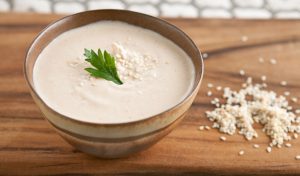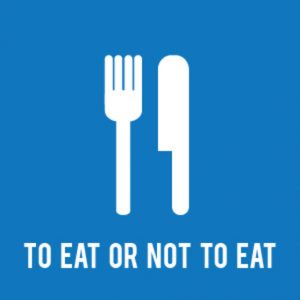
When you’re pregnant, what you eat affects not only your health, but your baby’s as well. Due to the fact pregnancy affects your immune system, you and your unborn baby are more susceptible to the bacteria, viruses, and parasites that cause foodborne illness.
Even if you don’t feel sick, some “bugs” like Listeria and Toxoplasma can infect your baby and cause serious health problems. Your baby is also sensitive to toxins from the food that you eat, such as mercury in certain kinds of fish.
You may hear advice from different sources about what you should and should not eat when pregnant.
Tahini
Tahini is a delicious paste made from sesame seeds and is used in many Middle Eastern spreads and  dips. It can be used by itself or, as a flavour enhancer in sauces and dressings. Tahini is perhaps best known as an ingredient used in the manufacture of hummus.
dips. It can be used by itself or, as a flavour enhancer in sauces and dressings. Tahini is perhaps best known as an ingredient used in the manufacture of hummus.
Listeriosis and Salmonella are foodborne illnesses which can occur during the production and storage of all processed foods. These illnesses have been quoted as the main points of concern regarding the safety of tahini and hummus during pregnancy. Although the Listeria monocytogenes bacterium is harmless to most healthy adults, it can cause serious illness during pregnancy.
During pregnancy, your immune system doesn’t respond as vigorously to threats. This is a protective mechanism that keeps your body from rejecting your growing foetus.
Craving Hummus During Your Pregnancy?
If you do choose to eat hummus during pregnancy, rather than buying commercially prepared hummus, consider making your own. Hummus should be stored in the fridge and consumed within two days of making it.
Below are some of the main findings currently out there on the World Wide Web when it comes to consuming tahini.
Who says it’s okay to eat tahini during your pregnancy

- The BabyCenter website lists hummus as a healthy snack for mums-to-be.
- Sesame seeds and tahini are full of essential nutrients and even a small serving is a good source of protein, fiber and minerals.
- Sesame seeds are a good source of calcium. Calcium is important for healthy teeth and bones. Pregnant women need 1,200 milligrams to 1,500 milligrams of calcium a day.
- Tahini contains plant-based substances called phytosterols that add to the effect of healthy fats by lowering cholesterol which benefits the heart.
- Tahini is a good source of omega-3 fatty acids. Studies on omega-3 fatty acids found that pregnant women who consume omega-3s give birth to babies with a lower risk of food allergies and eczema. This follows earlier research that suggested a low intake of omega-3 fatty acids could increase the risk of mothers having an early delivery.
- Sesame seeds and tahini provide four nutrients that support your immune system. Just one tablespoon of tahini has 26 percent of the recommended daily intake of copper and 9 to 12 percent of zinc, iron and selenium. These nutrients work by aiding the production of antioxidants and antibodies to support the immune system. Antioxidants are one of the most important components to having healthy fertility that every couple needs to focus on.
- Tahini is a good source of B Vitamins, which amongst other benefits keep the nervous system functioning properly.
- Tahini also contains folate, which is an important nutrient for women of child-bearing age. Folate is vital to the creation and growth of new cells. Women lower the chance of birth defects when they get enough folate before becoming pregnant and in the early weeks of pregnancy. Two tablespoons of tahini have 28 micrograms of folate. Men and women trying to conceive (ttc) and pregnant women are advised to consume 400 – 600 micrograms of folate daily.
- Black sesame seeds are an excellent source of calcium and are believed to help increase milk supply in nursing mothers.
Who says it’s NOT okay to eat tahini during your pregnancy
- In December 2014, following a salmonella outbreak attributed to contaminated tahini, the government department responsible for food safety in New Zealand instigated a recall for a specific product brand. In the same PR document they further recommended that:
- As a general food safety precaution, tahini should be kept in the fridge and consumed by its use-by date. As with all foods, once the use-by date has expired it should be thrown out.
- Pregnant women and people with lowered immunity do not eat tahini or foods containing tahini, such as hummus. This stance is further endorsed by the NZ government in their “Eating for Healthy Pregnant Women” brochure.
- In the Indian culture, there is a belief that sesame seeds are a “heat producing” food. The added “heat” from the sesame seeds, according to this belief, upsets your natural balance during pregnancy, which may harm the baby, increasing your risk of miscarriage or premature labor. However, no evidence supports these beliefs or the idea that eating sesame seeds might cause any harm during pregnancy, according to the BabyCenter India website.
- The “Food Safety During Pregnancy” brochure offered by the NSW Food Authority in New South Wales, Australia, labels hummus as a food that should be eaten with caution during pregnancy.
What’s the verdict?

Is it safe to eat tahini when pregnant?
It seems that tahini is one of the best things you could be consuming when you are pregnant. The only concern is if it is contaminated… Of which there has only been one contamination scare globally.
It’s best to steer clear of some foods when you are pregnant in case they make you ill or harm your baby. Pregnant women need to avoid infections like salmonella, listeria and toxoplasmosis.
The NHS advises pregnant women avoid mould ripened soft cheeses such as brie and soft blue-veined cheeses such as gorgonzola, raw or partially cooked eggs, raw or undercooked meat, pate, liver and raw shellfish, shark, swordfish and marlin which contain high levels of mercury should not be eaten during pregnancy and the amount of tuna eaten should be avoided too. Eating tinned foods are also dangerous due to heavy metal exposure which further weakens your immune system.
 Try to use the time when you are pregnant to have a rethink of your foods, choose good healthy options and be aware of food hygiene.
Try to use the time when you are pregnant to have a rethink of your foods, choose good healthy options and be aware of food hygiene.
Rich in good-for-you nutrients, sesame seeds make a healthy addition to your diet during pregnancy, and you do not need to avoid them unless your doctor advises you to. You can add them to your morning bowl of hot cereal or toss them in your salad at lunch for nuttiness and crunch. They also make a good addition to a chicken and veggie stir-fry. You can also add sesame seeds to steamed rice or quinoa for extra flavour and nutrition.
The food manufacturing process increases the possibility of food based bacteria such as salmonella and listeria. To avoid this make your own tahini and hummus. Store in the fridge in a container with a lid, and consume within two days of making.
A healthy fertility diet should be about eating everything as close to its natural sources as possible, cutting down on sugars and cutting out alcohol, caffeine, smoking and processed foods.
Pregnancy is what you are designed for; take precautions and consult your doctor or a natural fertility consultant should you have any concerns about your pregnancy diet.
Sources
http://healthyeating.sfgate.com/nutritional-roasted-sesame-tahini-1884.html
http://www.foodsafety.govt.nz/elibrary/industry/recall-salmonella-tahini.htm
http://www.livestrong.com/article/476934-why-should-you-avoid-sesame-seeds-while-pregnant/
http://www.livestrong.com/article/458572-is-it-ok-to-eat-hummus-when-pregnant/
http://www.babycenter.in/a1049926/foods-that-help-increase-breastmilk#ixzz3ef3GZfMI
http://www.webmd.boots.com/pregnancy/features/toxins-pregnancy
http://www.nhs.uk/conditions/pregnancy-and-baby/pages/food-safety-hygiene.aspx#close
Other Topics Worth Reading:
- I’m Pregnant, now what? – Read here
- Pregnancy Support: Know what to do and what to avoid when pregnant – Read here
 About the author:
About the author:
Fiona Boulton is a Fertility Expert
(since 2007) and leader in Fertility Mind Mastery, Fertility Meditation, Fertility Yoga and Fertility Coaching –
helping people take back control of their fertility, faster.
Fiona is the founder of Awakening Fertility – Harley Street (Harley Street Fertility Clinic), London; Concept Fertility Putney; Chichester, West Sussex and Perth, Australia
- Huffington Post Fertility Writer

- Fertility Coach
- Fertility Support Group Co-ordinator for Harley Street Fertility Clinic and Infertility Network UK
- Nutrition Counsellor
- Public Speaker
- Author
- Blogger
- QiYoga® Founder
- Fertility Yoga Teacher Trainer (RYS 200)
- Fertile Lifestyle Motivator
- Fertility Support Group Facilitator
- Fertility Practitioner Training Co-ordinator
Through Fiona’s “transformation guaranteed” Fertile Lifestyle courses, Fiona helps navigate major transitions to detox your mind and body to help you effectively ‘think yourself fertile’; to change the map your mind has of your body and therefore change your physiology by clearing mental and emotional blockages to having your baby. Fiona’s work focuses on you taking back control by changing the internal and external environment of your cells so you can improve chances of fertility success.
Book your fertility consultation from the comfort of your home or come to the Harley Street Fertility Clinic for a transformative session with Awakening Fertility founder Fiona Boulton, here.



So… The verdict seems to be that if you want to get all the benefits of sesame seeds then tahini is the way forward and to know that with any processed food you run the risk of it being contaminated?
As there has not been a contamination problem in this country I feel safe to consume it – thanks for the tips!
Mmmmmm!
I love tahini! I love it for breakfast and I mix with honey as a delicious treat when craving something sweet.
I never really heard about tahini but now that I see the benefits I cant wait to try it… I am not going to buy any more shop bought hummus but will buy shop bought tahini.
Thanks…x
Tahini sounds amazing. I want to try it now!
I dont want to risk tahini but I am going to add sesame seeds to everything now!!
Fiona, are there any that you recommend or are they all the same?
Hi Alex
Great question!
Apart from the fact black sesame seeds have more nutrients than white ones, it goes without saying that having organic sesame seeds are also better for you (i.e. – not laden with toxic chemicals. Organic is also full of double the amount of phytonutrients which is what your body needs lots of so that you and your baby get all the nutrients and energy you need).
OK – off to buy some black organic sesame seeds this week.
That’s a no brainer for me :)
Not pregnant yet, but going to enjoy lots of tahini now. I had it years ago with honey on toast and felt it was a “naughty treat” but now I know it is a BRILLIANT FERTILITY FOOD COMBO! :D
Thank you for the information
A very helpful article.
Thanks!
This article: Is Hummus Safe To Eat When Pregnant?
has been a Godsend… It is so confusing what to eat and what not to eat… So, I have decided to sign up to your pregnancy course Fiona.
This is the link I am going to (in USD), if there’s another let me know https://courses.awakeningfertility.com
Thank you for Is Hummus Safe To Eat When Pregnant? , it is very informative.
:)